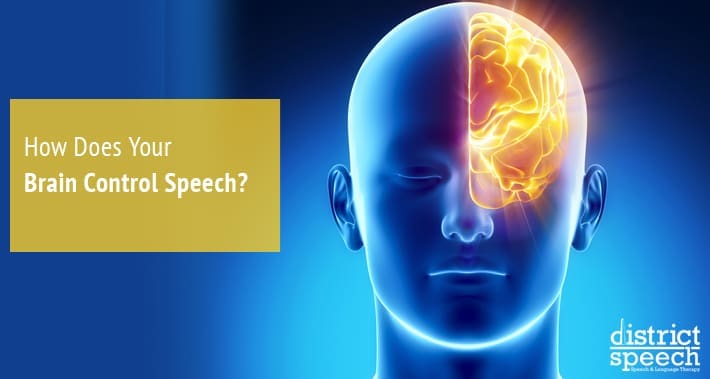
The largest, and arguably most important, organ in your body is your brain.
Your brain controls everything you do, feel, see, and experience.
Speech is an important way to interact with the world, and is controlled by the brain.
It’s a complex process, and there are many parts of the brain involved.
The largest section of the brain, the cerebrum, is primarily responsible for speech.
If any of these parts are damaged, speech can be affected.
The effects can be mild or more serious, but either way, speech therapy can help.
If you are looking for speech therapy following a traumatic brain injury (TBI), our Washington DC speech pathologists can help your or a loved one.
RELATED: Learning To Speak Again After Traumatic Brain Injury
Many people have questions about speech after a TBI:
How does your brain produce and control speech?
What happens if one of the parts responsible is damaged?
How can speech therapy help afterwards?
Below we take a closer look at these and more about speech and TBI.
What Parts Of Your Brain Are Involved In Speech?
The brain is made up of several different parts, but the part that is most involved in speech production is the cerebrum.
The cerebrum is the largest part of your brain.
It’s made up of two halves, or hemispheres.
The left hemisphere is typically the one most responsible for speech, though one third of left handed people may actually use their right hemisphere for speech.
The two halves of the cerebrum are connected by the corpus callosum, a band of nerve fibers.
Recent research has shown that speech is likely produced through a complex network in the brain.
The cerebrum is the primary, but not only part responsible for speech production.
Because speech production requires several processes, from a thought to an intention to a sound, several brain parts are involved.
If any of these parts are injured or damaged, it can affect your ability to produce speech.
An inability to produce or understand speech is called aphasia, while an inability to move the muscles necessary for speech is called apraxia.
Both aphasia and apraxia can be caused by head injury, stroke, or illness.
Symptoms of each can vary, depending on the location and severity of the damage.
Here we will dig deeper into the parts of the brain responsible for producing speech, and how brain injuries can impede speech.
1. Your Broca’s Area
The Broca’s Area is located in the front of the left hemisphere of the cerebrum.
It was discovered in 1861 by French doctor Pierre Paul Broca.
Helping to turn thoughts into speech, it transmits information to the motor cortex, another part of your brain that makes your mouth move.
The Broca’s Area is most active just before you speak.
What Happens If It’s Damaged?
Damage to the Broca’s Area can cause speech to sound slow or slurred, or can make it difficult for a person to make the sounds of speech at all.
Speech may also be limited to short sentences, referred to as Broca’s aphasia, or non fluent aphasia.
2. Your Wernicke’s Area
The Wernicke’s Area is located in the left hemisphere of the cerebrum, in the temporal lobe, just behind your ear.
Discovered in 1876 by Karl Wernicke, it is involved primarily in the comprehension of written and spoken language.
What Happens If It’s Damaged?
Damage to the Wernicke’s Area affects comprehension, and may cause someone to speak in long sentences that make no sense.
This affliction is called fluent aphasia.
The most common cause of damage to the Wernicke’s Area is stroke, but may also be caused by head trauma, infection, or disease.
3. Your Arcuate Fasciculus
The arcuate fasciculus is a band of nerve fibers that connects the Broca’s Area and the Wernicke’s Area.
The exact function of the arcuate fasciculus is unclear, but it’s believed to be primarily involved in the processing of complex syntax.
What Happens If It’s Damaged?
If the arcuate fasciculus is damaged, you may be unable to repeat language back after you’ve heard it.
This is called conduction, or associative, aphasia.
Someone with conduction aphasia is typically still able to read, write, speak, and understand language normally.
4. Your Motor Cortex
The motor cortex is located in frontal lobe, and is made up of three parts: the primary motor cortex, the premotor cortex, and the supplementary motor area.
Each hemisphere of the cerebrum has a motor cortex controlling the movements on that side.
It is responsible for all voluntary movements in your body.
This includes controlling the movements of the mouth, tongue, and throat for speech production.
Taking information from the Broca’s Area, the motor cortex sends signals to your lips, tongue, and mouth how to move to create the words you want to say.
What Happens If It’s Damaged?
If the motor cortex is damaged, you may lose coordination and dexterity, or have trouble performing fine motor skills. .
Mobility would be affected on the side of the damage; for instance, if the right motor cortex was damaged, movement would be impeded on the right side of the body.
It can also affect the production of speech by weakening or paralyzing the muscles used to
speak.
With therapy and repetition, these impairments can be improved.

5. Your Cerebellum
The cerebellum is located at the back of your head, just above where your spinal cord attaches to your brain.
It is below your cerebrum.
The cerebellum’s primary functions are related to balance and the coordination of movement.
It is also believed to play a role in the processing of language.
What Happens If It’s Damaged?
Damage to, or dysfunction of, the cerebellum can cause ataxia, a loss of muscle coordination or control.
Ataxia can cause issues with speech, as the muscles of the face become harder to control.
Ataxia is a type of dysarthria, which is characterized by weakness of the muscles used for speech, or an inability to control these muscles.
Dysarthria can be caused by a variety of factors, including medication, illnesses causing paralysis, or injury.
Ataxic dysarthria is related specifically to damage to the cerebellum.
It can be caused by brain injuries, tumors, infection, toxins, or strokes.
If the cause of the ataxia can be treated, the ataxia may be reversible.
Book Your Appointment With District Speech Today
The brain is a complex organ, and speech is a complex process.
Many parts of the brain are involved in speech production.
They control everything from creating and processing ideas, to moving your mouth and making sound.
If any one of these parts of the brain is damaged or injured, it can affect your ability to speak.
These issues may be improved, or sometimes even resolved, through speech therapy.
If you are having trouble with speech due to a brain injury, contact today.
1300 I St NW, Suite 400 E,
Washington, DC 20005
- https://g.page/districtspeech
District Speech and Language Therapy specializes in speech therapy, physical therapy, and occupational therapy solutions, for both children and adults, in the Washington D.C and the Arlington Virginia areas.